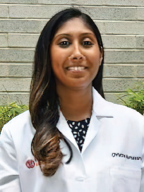Cardiac Amyloidosis
Early diagnosis of cardiac amyloidosis gives the best chance for optimal results. Unfortunately, individuals with cardiac amyloidosis may be experiencing vague (not specific) symptoms, and the diagnosis may be mistaken for other conditions like heart disease due to high blood pressure. This is why specialized programs like the Weill Cornell Medicine’s Cardiac Amyloidosis Program are so important for patients. Our program offers specialized expertise in both the diagnosis and treatment of patients with heart failure due to cardiac amyloidosis.
What is Cardiac Amyloidosis?
Cardiac amyloidosis is a clinical disorder that develops when the amyloid protein builds up in your heart. This buildup interferes with your heart’s ability to pump blood and can lead to heart failure. The amyloid protein may also build up in other organs throughout the body leading to easy bruising or numbness in the hands or feet.
There are two main types of cardiac amyloidosis, based on the type of protein involved. The more common form of cardiac amyloidosis is called by a protein called TTR (or transthyretin). The other form is called amyloid light-chain (AL) amyloidosis, and is caused by an excess of light chains in the blood from a monoclonal gammopathy.
Multidisciplinary Care for Cardiac Amyloidosis
At Weill Cornell Medicine, our multidisciplinary group of doctors includes cardiologists, hematologists, neurologists and others who work together to create a comprehensive, individualized treatment plan for patients with cardiac amyloidosis.
Our diagnostic tools include cardiac MRIs, nuclear scans and cardiac biopsies.
Your treatment will depend on the type of amyloidosis you have. These include:
- Medication therapies: Oral medications (stabilizers) and injections (silencers) for TTR cardiac amyloidosis; and chemotherapy (for AL amyloidosis)
- Electrical Rhythm issues: Many patients with cardiac amyloidosis can develop a slowing of the electrical system in the heart and require a permanent pacemaker. Many patients with cardiac amyloidosis can also develop atrial fibrillation, which may require medications or procedures like an ablation. We work closely with our electrophysiologists to optimize therapy for these electrical rhythm issues.
- Heart transplantation: In rare cases, a person with cardiac amyloidosis that is not effectively controlled with other therapies may need a heart transplant.
- New cardiac amyloidosis therapies through research: Researchers at Weill Cornell Medicine have been involved in clinical trials of new therapies for cardiac amyloidosis, which we offer to our patients as a way to access the latest therapies and advance science.
Schedule an Appointment
To schedule an appointment to see one of our physicians with expertise in cardiac amyloidosis, you may call our physician offices directly at (646) 962-7571.
If you are already an established patient, you may also request an appointment online using Weill Cornell CONNECT. We will make every effort to contact you within 24 hours.
Our staff is here to help coordinate your care. They will provide you with information on our physicians, their areas of expertise and help arrange for your visit and other testing when appropriate.
WCM Cardiac Amyloidosis Brochure
Learn more about cardiac amyloidosis and our program—one of the few dedicated cardiac amyloidosis centers in the country.
Our Physicians

Parag Goyal M.D., M.Sc.
Associate Professor of Medicine, Director, Heart Failure with Preserved Ejection Fraction Program


Maria Karas, M.D.
Associate Professor of Clinical Medicine, Director Cardiac Care Unit, Director Clinical Affairs


Irina Sobol, M.D.
Assistant Professor of Medicine, Director Advanced Heart Failure Fellowship Program

Christina Ramasami, N.P.
Nurse Practitioner


